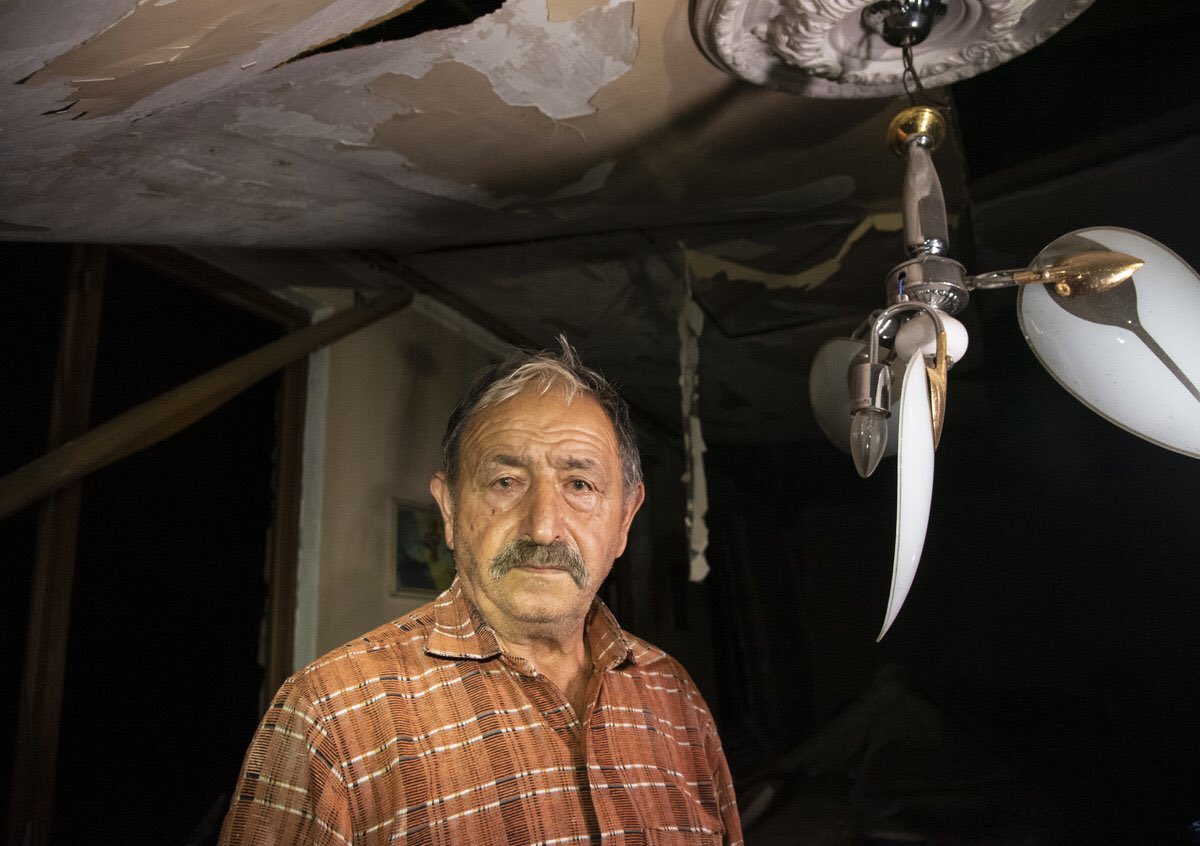
STEPANAKERT—Early this morning, I was awakened by distant thuds, sounding at regular intervals, as Artsakh’s capital once again felt the attack of Azerbaijani bombing raids. Fortunately, the attack was a brief one, but the message had been sent once more: Azerbaijan and its powerful friends are not going away anytime soon. Not this time.
As war continues to rage along Artsakh’s perimeter, Stepanakert has taken on the look and feel of a ghost-town. Half of its population has evacuated, while the other half spends its time either scurrying from place to place, avoiding broad daylight, or hunkered down in underground bunkers and basements. Those who have stayed are mostly needy, elderly or performing essential functions for our defense. And while our people’s demeanor is still tough and resilient, it is tempered by the realization that we’re in this alone, without powerful protectors or even mediators.
The city itself is fairly intact, but an extensive tour reveals quite a bit of damage—much of it well-planned. Indeed, from the first day it became clear that these air raids weren’t the usual Azeri slapdash affair. Important utilities and infrastructure were hit, throwing our defenses off-balance. Significant symbols like St. Ghazanchetsots and the Defense Ministry were targeted, as if to tell us that nothing is safe anymore. And interspersed were the regular bombings of civilian structures – city streets, storefronts, apartment buildings – in an apparent attempt to intimidate us.
Overall, Armenian Armed Forces have performed heroically – withstanding the blitzkrieg of the combined Azeri, Turkish and mercenary forces, and holding our positions remarkably well. But as I toured various sites today, it became clear that the game-changer has been Turkey’s direct involvement. The scale and precision of operations are an order of magnitude better than what we’ve seen in past encounters. And the presence of sophisticated drones and aerial weaponry are changing the rules of warfare, causing substantial human losses never before seen. Everyone here firmly believes we can win a fair fight, but it seems this time that the odds have been tilted way out of balance.
Is there a positive end in sight? Not yet clear, unfortunately. For the moment, it appears that this life-or-death struggle will continue with most of the world simply watching, or at best offering lip-service. The OSCE Minsk Group—ostensibly in charge of a peace settlement—has shown itself to be weak, tentative, even impotent. Meanwhile, international public opinion—while becoming aroused of late—seems a weak counterbalance to Turkey’s zealous advances.
But above all, there is the oft-repeated question – sometimes shouted, sometimes whispered – namely, “Where are the Russians?” Armenia’s traditional guarantor, Russia has been noticeably cautious in its efforts to restrain Turkey thus far. Perhaps this is due to Russia’s weakened condition after years of US sanctions, recession and struggles to maintain influence elsewhere in its periphery. Perhaps it is also due to Russia’s reluctance to further complicate its ties with Turkey, with whom it already has proxy wars in Syria and in Libya. In any event, it seems that Russia’s ability to manage the Karabakh issue is now in jeopardy. For rather than operating as the hegemonic power in a post-Soviet space, it now must contend with a new, aggressive power—Turkey—that is poised to turn Karabakh into an interzonal conflict.
Fortunately, it appears that Moscow is starting to wake up…albeit late. It now sees that Karabakh is not the end but actually the beginning of a new struggle for control of the Caucasus. As it consolidates this view, Moscow may indeed start showing teeth in the face of Turkey’s aggression. There are various signals indicating this may happen. But when?
In the meantime, Artsakh’s Armenians have no choice but to go it alone, waging a fierce survival war that is not of their creation. And while the front-lines remain ablaze, Stepanakert will continue holding out gamely until better days finally emerge.


Thank you for this well-written article and astute perspective.
Thank you Unger Antranig!
Thank you Unger. Beautifully written.
Sireli Unger Antranig: I am forever grateful for your article as well as your always “being there” for us throughout the years and most importantly now. Your article was factual and gave a clear view of what has transpired along with your grasp of optimism for Russia’s intervention.
Fraternally with Love,
մարօ Garabedian-Dionisopoulos